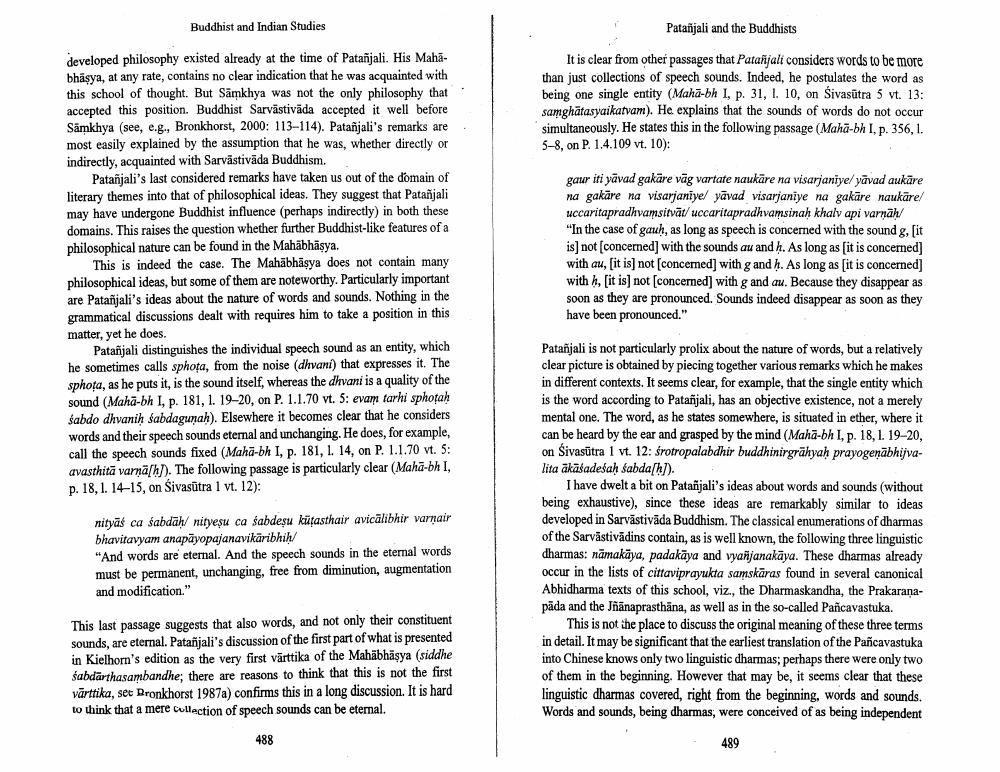Book Title: Patanjali And Buddhists Author(s): Johannes Bronkhorst Publisher: Johannes Bronkhorst View full book textPage 3
________________ Buddhist and Indian Studies developed philosophy existed already at the time of Patañjali. His Mahābhāṣya, at any rate, contains no clear indication that he was acquainted with this school of thought. But Samkhya was not the only philosophy that accepted this position. Buddhist Sarvästivada accepted it well before Sämkhya (see, e.g., Bronkhorst, 2000: 113-114). Patañjali's remarks are most easily explained by the assumption that he was, whether directly or indirectly, acquainted with Sarvästivada Buddhism. Patanjali's last considered remarks have taken us out of the domain of literary themes into that of philosophical ideas. They suggest that Patanjali may have undergone Buddhist influence (perhaps indirectly) in both these domains. This raises the question whether further Buddhist-like features of a philosophical nature can be found in the Mahabhāṣya. This is indeed the case. The Mahabhäṣya does not contain many philosophical ideas, but some of them are noteworthy. Particularly important are Patanjali's ideas about the nature of words and sounds. Nothing in the grammatical discussions dealt with requires him to take a position in this matter, yet he does. Patanjali distinguishes the individual speech sound as an entity, which he sometimes calls sphota, from the noise (dhvani) that expresses it. The sphota, as he puts it, is the sound itself, whereas the dhvani is a quality of the sound (Maha-bh I, p. 181, 1. 19-20, on P. 1.1.70 vt. 5: evam tarhi sphotah sabdo dhvaniḥ śabdagunah). Elsewhere it becomes clear that he considers words and their speech sounds eternal and unchanging. He does, for example, call the speech sounds fixed (Maha-bh I, p. 181, 1. 14, on P. 1.1.70 vt. 5: avasthita varnä[h]). The following passage is particularly clear (Maha-bh I, p. 18, 1. 14-15, on Śivasūtra 1 vt. 12): nityaś ca sabdaḥ/ nityeşu ca śabdeṣu kütasthair avicälibhir varṇair bhavitavyam anapayopajanavikäribhiḥ/ "And words are eternal. And the speech sounds in the eternal words must be permanent, unchanging, free from diminution, augmentation and modification." This last passage suggests that also words, and not only their constituent sounds, are eternal. Patanjali's discussion of the first part of what is presented in Kielhorn's edition as the very first värttika of the Mahabhäṣya (siddhe sabdarthasambandhe; there are reasons to think that this is not the first värttika, set Bronkhorst 1987a) confirms this in a long discussion. It is hard to think that a mere collection of speech sounds can be eternal. 488 Patanjali and the Buddhists It is clear from other passages that Patanjali considers words to be more than just collections of speech sounds. Indeed, he postulates the word as being one single entity (Maha-bh I, p. 31, 1. 10, on Śivasutra 5 vt. 13: samghātasyaikatvam). He explains that the sounds of words do not occur simultaneously. He states this in the following passage (Maha-bh I, p. 356, 1. 5-8, on P. 1.4.109 vt. 10): gaur iti yāvad gakāre vāg vartate naukāre na visarjaniye/ yāvad aukāre na gakāre na visarjaniye yavad visarjaniye na gakāre naukare/ uccaritapradhvamsitvat/ uccaritapradhvamsinah khalv api varṇaḥ/ "In the case of gauḥ, as long as speech is concerned with the sound g, [it is] not [concerned] with the sounds au and h. As long as [it is concerned] with au, [it is] not [concerned] with g and h. As long as [it is concerned] with ḥ, [it is] not [concerned] with g and au. Because they disappear as soon as they are pronounced. Sounds indeed disappear as soon as they have been pronounced." Patanjali is not particularly prolix about the nature of words, but a relatively clear picture is obtained by piecing together various remarks which he makes in different contexts. It seems clear, for example, that the single entity which is the word according to Patanjali, has an objective existence, not a merely mental one. The word, as he states somewhere, is situated in ether, where it can be heard by the ear and grasped by the mind (Maha-bh I, p. 18, 1. 19-20, on Śivasutra 1 vt. 12: śrotropalabdhir buddhinirgrahyah prayogenābhijvalita ākāśadeśaḥ śabda[h]). I have dwelt a bit on Patanjali's ideas about words and sounds (without being exhaustive), since these ideas are remarkably similar to ideas developed in Sarvästiväda Buddhism. The classical enumerations of dharmas of the Sarvästivadins contain, as is well known, the following three linguistic dharmas: nämakaya, padakaya and vyañjanakaya. These dharmas already occur in the lists of cittaviprayukta samskaras found in several canonical Abhidharma texts of this school, viz., the Dharmaskandha, the Prakaraṇapada and the Jñanaprasthāna, as well as in the so-called Pañcavastuka. This is not the place to discuss the original meaning of these three terms in detail. It may be significant that the earliest translation of the Pañcavastuka into Chinese knows only two linguistic dharmas; perhaps there were only two of them in the beginning. However that may be, it seems clear that these linguistic dharmas covered, right from the beginning, words and sounds. Words and sounds, being dharmas, were conceived of as being independent 489Page Navigation
1 2 3 4
